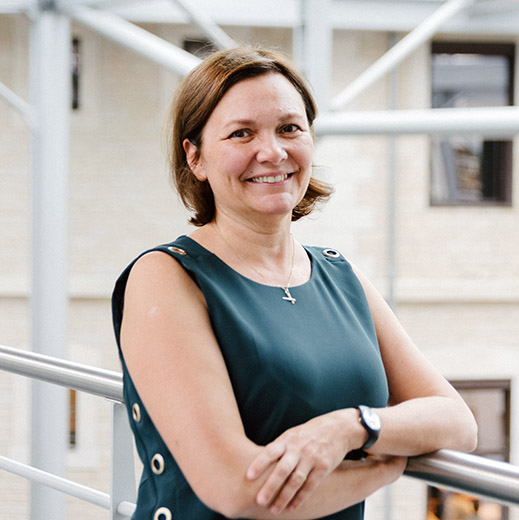Vulnerability from a cross-disciplinary perspective
Why Vulnerability as a theme?
Valérie Aubourg. The choice of vulnerability as a subject stemmed from an observation. Here at UCLy, many research centres and Master's programmes are devoted to it. So we are required to consider it from a cross-disciplinary perspective.
What research projects are you referring to?
V.A. The "Vulnerable Persons and AI" project, for example. It focuses its analyses on the relationship between vulnerable elderly people and the most varied forms of artificial intelligence.
Another example that comes to mind is of course the Chair in "Education and Early Childhood" and its first seminar, which was held this year on the theme L’enfance, ses blessures et les voies (x) pour le dire (Childhood, its traumas, and the means [voices] to express them).
Meanwhile, the Pôle 5 researchers working on integral development, ecology, and ethics, are leveraging the paradigm of vulnerability to turn it into an efficient ethical principle for the foundations of integral ecology.
And which Master's programmes are you thinking of?
V.A. Of the Master's in "Rights of Children and Vulnerable Persons", which centres on persons deprived of freedom, migrants and orphans; and the Master's in "Clinical Psychology of Children and Adolescents", which is more specifically concerned with meeting and supporting troubled children and adolescents.
Looking beyond the individual dimensions of vulnerability, the Master's[1] offered by the Institute of Human Rights (IDHL) examines this issue through the prism of international relations and of the big societal challenges.
The ESDES Business School, taking into account the violence of the neo-liberal economy and of the social and psychological suffering that it generates, has teamed with the Faculty of Philosophy to jointly initiate the Master's in "Management, Social Sciences and Innovation", which combines the business models of efficiency and profitability with human, cultural and spiritual perspectives.
A collaborative project
Having said that, UCLy isn't alone in focusing on the theme of vulnerability!
V.A. Indeed! Nearby, colleagues who are members of Lyon research centres have, for example, taken part in the ambitious programme run by the National Research Agency (ANR), « vulnérabilité : à l’articulation du sanitaire et du social » ( "Vulnerability: where health and social factors intersect"[2]), which, incidentally, reflects the interest being shown in this theme by the academic world.
So, what is the distinctive feature of the Confluence Sciences and Humanities Research center ?
V.A. What sets this research center apart is that it conducts cross-disciplinary thinking on the subject of vulnerability, beginning by looking back at the emergence and the scope of this complex concept. The situations that are analysed may pertain to various stages of life (children, adolescents, the elderly) and various categories of individual (women, people with a disability, prisoners, migrants, etc.), and cover several fields (environmental, health, social, economic…).
To address this theme differently, we propose to change viewpoint, choosing to not see vulnerability – i.e. exposure to risk, to suffering, to the part or total destruction of self and of the world – as solely a curse. While vulnerability concerns others (to which attention should be paid by protecting, caring for and helping them), it concerns us too, as an experience that constitutes our humanity. Such an approach could prompt us to consider vulnerable persons differently, and to rethink the relationship between them and those who claim to protect them.
In addition, recent events are encouraging us in this direction. The health crisis has revealed our vulnerability – human, societal and environmental. We will need to study its effects.
A theme that matter to UCLy
In essence, do your approach and this choice of theme precisely match our university's Catholic identity?
V.A. Yes, vulnerability has long been one of UCLy's areas of interest. Its thinking is specifically nourished by an approach to the bible texts, and we know the attention that they pay to the fragile. Moreover, these texts are mindful to promote an approach to man through the limits and trials inherent to his existence.
In concrete terms, what initiative will be taken in favour of this theme in the coming months?
V.A. We're looking at a tremendous academic event at the start of the 2021 academic year, followed by a day-long symposium for lecturer-researchers. But also specifically for UCLy Master's students.
[1] Master's in "History, Theory and Practice of Human Rights", "Right to Freedoms" elective mention.
[2] The ANR thematic programme (2008 edition), "Vulnerability: at the heath-social intersection", supported 13 projects including "Lyon vulnérabilité (1880-2010)" coordinated by the historian Axelle Brodiez-Dolino.

